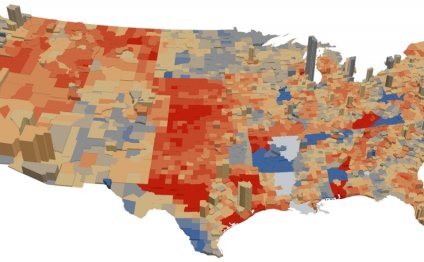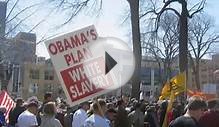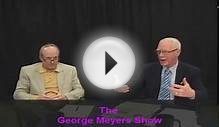
What is the Tea Party?
Most Americans think the Tea Party movement was a conservative protest against the Obama administration’s progressive policies. It certainly became that, but it didn’t begin as an outpouring of principled or coherent conservatism—nor was it only a movement of the Right.
In its wrath against Wall Street and crony capitalism, for example, the early Tea Party contained elements of the political Left. More than a complaint over any specific grievance, early Tea Party rallies—hodge-podge affairs featuring tri-cornered hats and, in a few cases, offensive signs—were an expression of deep anger and disillusionment, not with a particular party but with a political establishment perceived to serve special interests, not the American people.
Much of that populist anger was captured and channeled into Republican electoral victories in the 2010 and 2014 midterms, but its roots weren’t entirely partisan. Today, some eight years after the first Tea Party rallies, that anger hasn’t subsided. Its most visible expression has taken the form, paradoxically, of support for Donald Trump—a candidate who declared, the day the Tea Party staged its first large-scale protest in 2009, “I don’t march with the Tea Party.”
He meant it. At the time, Trump publicly supported all the policies the Tea Party opposed: the bank bailouts, the auto bailout, the stimulus, socialized medicine. Anger over those things is what galvanized the Tea Party into a national opposition movement.
Then last week Sarah Palin, once the “mama grizzly” of the Tea Party who had backed Ted Cruz’s 2012 Senate run, endorsed Trump for president.
What happened? How could a movement that in 2010 swept away GOP establishment candidates in favor of principled conservatives like Mike Lee, Rand Paul, and Nikki Haley now be drawn to a candidate as ambivalent about conservative principles as Trump?
The Tea Party Wasn’t a Right-Only Affair
Perhaps Trump has changed his mind, as many others have, after seven years of Obama. One would think principled conservatives would be especially sympathetic to such a change of heart.
Or perhaps the Tea Party was never as ideologically pure as it appeared to be. There were early signs of this. The day after the first major Tea Party rallies in April 2009, Zephyr Teachout, (in a piece later pilloried by her peers on the Left) posited that the rallies represented no coherent political movement, that they were expressions of authentic anger, and that such anger was justified.
Teachout noted that “part of this anger is frustration that Congress is not being responsive, and that the administration is taking a ‘trust us’ approach.” She quoted a protester interviewed by CBS:
‘None of our representatives—Republican, independent, or Democratic—listen to us, ’ complained Maura Garvey. ‘This is a Republic. This is a government for the people, by the people. But that’s not happening here.’
‘This didn’t start in January with Obama, ’ she added. ‘You look back 20, 25 years, it started. It’s just that nobody had the gumption to stand up before now, because now it’s really gone overboard.’
Later, the Tea Party was understood as a reaction to Obama, but anger at the federal government was seething long before Obama took office. The first modern Tea Party event happened during the Bush administration, at a December 2007 fundraiser for Ron Paul that brought in more than $6 million and set a record for the largest single day of fundraising in presidential campaign history.
Paul’s campaign, like his political career, was a bundle of seeming contradictions: anti-abortion, anti-war, anti-drug war, anti-Medicare. His libertarian message—that our government must live, as we do, within its means—resonated with a core of passionate supporters who defied easy classification but were uniformly angry about the size and scope of government. A few years later, Juan Williams would argue that the Tea Party “grew out of the ashes” of Paul’s 2008 presidential run.
An Indictment of K Street and Wall Street
Of course, as it gained momentum and drew support from outside organizations, the Tea Party became a coherent movement within the GOP to wrest control of the party from the establishment. But rumblings on the Left, like the 2011 Occupy protests, showed a deep discontent in the Democratic Party’s coalition, too. As seemingly disparate as the two movements were, they shared an anger at Wall Street and the government’s unwillingness to hold it accountable for the financial crisis and the Great Recession.
They shared an anger at Wall Street and the government’s unwillingness to hold it accountable for the financial crisis and the Great Recession.
That feeling continues to be widespread. A poll last year commissioned by the progressive group Americans for Financial Reform found 70 percent agreed with the statement: “most people on Wall Street would be willing to break the law if they believed they could make a lot of money and get away with it.” Americans think Wall Street is simply corrupt.
Sen. Bernie Sanders, an avowed socialist, is mounting a credible challenge to Hillary Clinton on the basic premise that the game in Washington DC is rigged to favor the rich at the expense of the people. Trump, although he puts it in terms of “winning” and “losing, ” is tapping into those same feelings.
In his recent essay for The Atlantic, David Frum writes that “Trump’s surge was a decisive repudiation by millions of Republican voters of the collective wisdom of their party elite.” Part of Trump’s support, he says, comes from Tea Party Republicans who rejected establishment candidates in the 2010 and 2014 midterms, didn’t want Mitt Romney as their party’s nominee in 2012, and don’t put much stock in political experience this time around.
They feel ignored by GOP leadership and frustrated at the inability or unwillingness of congressional Republicans to push back against the Obama administration on a host of issues, from Obamacare to immigration.
An Outlet for Anger
But Frum also cites data suggesting what many other observers have noted, that Trump supporters don’t appear to be ideologically militant: “Just 13 percent said they were very conservative; 19 percent described themselves as moderate. Nor were they highly religious by Republican standards.”
Many voters are drawn to Trump not for principled reasons or a coherent policy agenda but because he serves as an outlet for their anger and frustration.
Like the early Tea Partiers, many voters are drawn to Trump not for principled reasons or a coherent policy agenda but because he serves as an outlet for their anger and frustration. Public trust in government has been declining for decades across the political spectrum. The Great Recession and its bailouts confirmed for many Americans, liberal and conservative and moderate, that government does not have their best interests in mind.
The GOP tried to capture the Tea Party, and to some extent it did. But it failed to assuage its anger—arguably, it made things worse. In their recent symposium against Trump, the editors of National Review claimed the Tea Party represented “a revival of an understanding of American greatness, ” understood as liberty through constitutional limited government, “an understanding to which Trump is tone-deaf at best and implicitly hostile at worst.” That no less a Tea Party icon than Palin is now endorsing Trump seems to be a sign of the movement’s dissolution. Jim Geraghty mused that perhaps the Tea Party isn’t just “splintered and weak. Maybe it’s dead.”
RELATED VIDEO



Share this Post
Related posts
What is the History of Afternoon Tea?
Tea consumption increased dramatically during the early nineteenth century and it is around this time that Anna, the 7th…
Read MoreEnglish Tea Party
Post navigation Previous Sivan & Kostia’s wedding is without a doubt one of the most creative, imaginative and inspiring…
Read More










